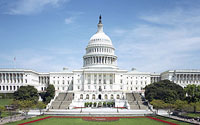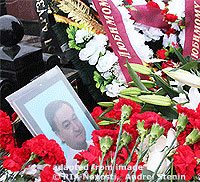Russian Experts Say Moscow Should Not 'Overreact' To Usa's Magnitskiy Bill
- JRL 2012-116
The so-called Magnitskiy Bill, approved by the US Senate Committee on Foreign Relations on 26 June, is designed to replace the Jackson-Vanik amendment as an instrument of influence on Russia, Russian political experts told Interfax, RIA Novosti and One Russia (United Russia) official website on 27 June.

The president of the Institute of Strategic Evaluations, Aleksandr Konovalov, said the adoption of Magnitskiy Bill would go hand in hand with the repeal of the Jackson-Vanik (JV) amendment that remains an obstacle for the US business in Russia.
"Everyone in the USA realizes that the (JV) amendment is getting too outdated, harming US economic interests. The Magnitskiy Bill is a replacement of some sort. Losing one instrument of influence, the (US) Congress aims to have a new one," he was quoted on One Russia website on 27 June.

The political scientist and Russian MP Vyacheslav Nikonov commented that the bill would most probably be adopted simultaneously with repealing the Jackson-Vanik amendment. Though "the adoption of a harsh sanction such as Magnitskiy Bill would be an unprecedented measure that had not been taken even in the most difficult period of the Cold War", One Russia website quoted Nikonov as saying.
The symmetrical response
In Nikonov's opinion, Russia would retaliate with introducing a "Guantanamo list or Viktor But's list" banning US officials allegedly involved in torture in Guantanamo prison, or in Viktor But's trial, from entering Russia.
However, such a symmetrical response by Russia would never yield symmetrical damage. "I have not heard that any of them (the US officials) have bank accounts in Russia, or are going to visit us," the pundit said.
The symmetrical ban on senior US officials, senators and congressmen visiting Russia could be a likely action if Magnitskiy Bill is adopted, agreed a member of the Russian Public Chamber, the director of the Institute of Political Studies, Sergey Markov.
"The level of people who could be affected by the reactive Russian sanctions is higher than that of Russians who were included into the Magnitskiy list. They are congressmen, senators, " Interfax quoted Markov as saying.
However, it remains a big question how effective Russian sanctions against the US officials would be.
"One has to be a realist. There is a colossal mismatch between the interest of our officials in the United States, the country's banks and property, and the interests of US officials in Russia," said the deputy director of the Russian Academy of Sciences Institute on the USA and Canada, Viktor Kremenyuk.
"Most Americans, especially those who represent the business community, have not the slightest interest in Russia. They do not see a large market here," Kremenyuk told RIA Nobosti on 27 June.
Overreaction and dramatization
In Kremenyuk's opinion, Russia should not overreact.
"The interests of some 100 (Russian) officials would be damaged. Is it a good reason to spoil relations with the States? This is the important question - our relations with the largest and the strongest country."
Editor-in-chief of "Russia in Global Politics" magazine, Fedor Lukyanov, doubted that adoption of the Magnitskiy Bill would have any practical effect: "The State Department and the White House have shown little interest in adopting the bill. They even tried to reduce a possible damage that the document could cause to the USA."
Nikolay Zlobin, the director of Russian and Asian programmes at the US World Security Institute, told RIA Novosti on 27 June that Russia should not dramatize the situation around Magnitskiy bill.
"Any country is free to restrict any foreign citizen from stepping on its territory."
"If it is in Russia's interest to ban a certain number of the US citizens from coming to Russia, then it should be done because of the national interest and not because of the Magnitskiy list."
The expert recalled that most senators and congressmen viewed the bill as a genuine attempt to help the Russian leadership to fight corruption. "It will be very difficult to explain to them why Russia takes a symmetrical action in response ," he added.
"People on Magnitskiy list who are allegedely involved in Magnitskiy's death have already been denied entry to the USA regardless of the prospects of the Magnitskiy bill being adopted. Congress wants to introduce this law, so Obama does not change his mind on banning ban these people," the pundit concluded.
"Therefore, Russia has to react calmly, intellegently and delicately instead of bursting with emotions and blowing a small issue into a large-scale drama."
Keywords: Russia, Assassinations, Beatings, Prison Deaths - U.S.-Russian Relations - Russian News - Russia
Relations between Russia and the United States will again be put to the test, as a key U.S. Senate committee approves legislation that would punish Russian officials over the high-profile death of lawyer Sergei Magnitsky. The issue, perhaps the thorniest between Russia and the United States, is set to anger a Kremlin that had long spoken out against the act. Now, as the bill nears passage, how will Russia respond and what does it mean for the future of U.S.-Russian relations?

The Senate Foreign Relations Committee on Tuesday unanimously endorsed the legislation, officially dubbed the "Sergei Magnitsky Rule of Law Accountability Act," which calls for travel bans and asset freezes for Russian officials implicated in the case. The vote coincided with a special presentation in Washington DC, in which Senator John McCain, a foreign policy hawk, introduced a video detailing potentially damning new evidence suggesting that Magnitsky had indeed uncovered a brazen tax fraud scheme organized by a criminal group with officials' involvement.

In a letter to U.S President Barack Obama, McCain urged the leader to press for tougher sanctions against Russia based on the newly revealed evidence. "Public information, much of it uncovered by Magnitsky himself before his arrest in Russia in 2008, suggests that the Klyuev group colluded with senior Russian officials to engage in bribery, fraud, embezzlement, company thefts and other serious financial crimes," McCain wrote, referring to Dmitry Klyuyev, whose Universal Savings Bank allegedly stored some of the fraudulent tax refunds.
Like the planned deployment of a U.S. missile defense system in Europe, the Magnitsky case has been a major bone of contention between the two major powers. Since the lawyer's death in 2009 while in pretrial detention, where he landed after investigating a massive tax fraud case implicating government authorities in the theft of hundreds of millions of dollars in refunds, the affair has formed the crux of U.S. criticism of Russia over human rights violations. The Barack Obama administration instituted a visa blacklist last summer for certain Russian officials believed to have been involved, fueling the Kremlin's anger and, according to some, straining the delicate U.S.-Russian "reset."
As the legislation creeps ever closer to being passed, it's sure to strike a nerve with the Russian leadership. The Kremlin, for its part, has already begun firing back. While it remains uncertain just how Moscow will counter the U.S. move, Russian officials have already issued a clear and somewhat ominous warning against pushing the legislation any further. "[U.S. officials have] an opportunity to weigh the consequences after all, so we urge our U.S. partners and U.S. lawmakers to do just that," Deputy Foreign Minister Sergei Ryabkov told reporters in Moscow on Wednesday, RIA Novosti reported.
Analysts have speculated, however, that Russia is prepared to take drastic steps against the United States if the Magnitsky Act is passed into law. According to political expert Alexei Arbatov, a senior analyst at the Institute of World Economy and International Relations, the Kremlin may strike out in retaliation at American business interests in Russia. "It's clear that Russia, even more than the United States, is interested in the development of economic relations, investment and high technology that the United States can provide," he told Kommersant FM radio on Wednesday. "But in such matters, Russia is ready to make any sacrifices necessary to demonstrate that it will not tolerate these sorts of interventions and sanctions against Russian officials."
Interestingly enough, President Barack Obama himself has opposed any further sanctions against Russian officials over the Magnitsky affair. While observers have said the U.S. president is wary of further damaging the fragile "reset" in relations between the United States and Russia, U.S. lawmakers have nonetheless banded together to press Russia on its alleged human rights abuse in a relatively rare show of bipartisan support. Most observers predict that Obama, given the wide-ranging support for the act, will not veto the legislation should it make its way to his desk.
A package deal might also be in the works: tied to the Magnitsky Act is the potential repeal of the much-debated Jackson-Vanik Amendment, a Cold War holdover that effectively limits trade between Russia and the United States over the former Soviet Union's own perceived human rights violations. The Obama administration has largely opted to champion the repeal of Jackson-Vanik over the Magnitsky Act, keeping in mind its already strained relations with Moscow. Analysts believe some senators are pushing for a "carrot-and-stick" approach: by pushing sanctions against the Kremlin via the Magnitsky Act, lawmakers also offer incentives by striking Jackson-Vanik from the books and restoring permanent normal trade relations with Russia, especially in time for its accession to the World Trade Organization.
Whether or not this method will work remains uncertain. And despite some possible disagreements in the United States over how or, perhaps, even whether to reprimand Russia, experts said U.S. displeasure with the Kremlin is nearly universal. "There is general vehemence about how the Magnitsky affair has been handled by the Russian government, and there's a broader, deeper concern about where Russia is heading with regard to democracy, human rights and the rule of law," said Andrew Kuchins, director of the Russia and Eurasia Program at the Center for Strategic and International Studies. "And so this is a way that Congress can weigh in on that."
But given the points of cooperation between Russia and the United States trade, the START nuclear arms treaty, and investment, to name a few how hard is the White House willing to push the Kremlin on human rights? According to Kuchins, the key lies in striking a balance: "If we're able to move forward and reach an agreement about the management of Syria, on missile defense, on Afghanistan the other core foreign security issues that are prominent in the relationship then that will certainly help the balance of the relationship," he said. "But if you've got disagreement on many of those issues...the balance shifts in the other direction, and the democracy, human rights and rule of law side dominates the relationship that much more."